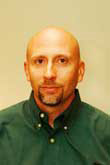
Malcolm Gladwell
Malcolm Gladwell has garnered a significant amount of fame and
respect as a writer of nonfiction, as a journalist and public intellectual. Gladwell's 2009 advice in Time , then,
to aspiring journalists stands as both provocative and illustrative of the
problem at the heart of media coverage of education and the education reform
debate:
"The issue is not writing. It's what you write about. One of my favorite columnists is Jonathan Weil, who writes for Bloomberg. He broke the Enron story, and he broke it because he's one of the very few mainstream journalists in America who really knows how to read a balance sheet. That means Jonathan Weil will always have a job, and will always be read, and will always have something interesting to say. He's unique. Most accountants don't write articles, and most journalists don't know anything about accounting. Aspiring journalists should stop going to journalism programs and go to some other kind of grad school. If I was studying today, I would go get a master's in statistics, and maybe do a bunch of accounting courses and then write from that perspective. I think that's the way to survive. The role of the generalist is diminishing. Journalism has to get smarter."
The media has changed dramatically, both in types of access to information and in the breadth of that access, in the past couple decades--including the rise of blogs allowing virtually anyone to publish as a journalist. The irony in this media evolution is that while even Gladwell seems to confront the professional preparation of journalists narrowly and while the new media has opened the door to journalism to any writer regardless of direct training experience in journalism, the education profession is experiencing a convoluted media-driven assault on its professionalism.
To add insult to injury, the so-called "liberal" media reports, perpetuates, and makes credible daily a neo-liberal, corporatist attack on the similarly labeled "liberal" public school system.
The media sits at the center of the current education reform debate, playing a powerful role that deserves no better than an "F" for the failure of the vast majority of that media to do as Gladwell implores: To rephrase, most educators don't write articles, and most journalists don't know anything about education, except how to report uncritically baseless and tired criticisms and assumptions.
The high-profile examples are easy to cite: Waiting for Superman, Bill Gates interviewed in Newsweek (and virtually everywhere else), Michelle Rhee and Geoffrey Canada on The Colbert Report (and virtually everywhere else), and episodes and segments of Oprah and Real Time with Bill Maher .
While high-profile media coverage and distortions of the education debate are powerful, the incessant drip of flawed media coverage occurring at all levels is equally corrosive.
For example, in December 2009, The Greenville News (Greenville, SC) published an Op-Ed by Dr. Jameson Taylor, "Educating Entrepreneurs Will Create Prosperity," claiming that public schools are failing based on NAEP scores. Then, Taylor proclaims:
"A new report by the South Carolina Policy Council shows that school choice programs in the counties of Clarendon, Hampton, Lee, Marlboro and Williamsburg could create 123 small businesses and 379 additional jobs. In fact, a statewide school choice initiative could create thousands of new jobs. These jobs are not teaching or administrative positions created by more state spending, but jobs created by the students themselves."
For the average reader, an Op-Ed by Dr. Taylor, identified as director of research at the South Carolina Policy Council, and a report from SCPC authored by economist Sven Larson present an authoritative message that matches two cultural narratives that are robust but lacking in evidence--simplistic claims of public education failure and the power of the free market.
I was immediately skeptical about the Op-Ed and the report since I was then working on a book on parental school choice ; the claims about schools and the conclusions of the study failed to match what I was examining in my research.
Several months later, the National Education Policy Center (NEPC) released a review of Larson's study and concluded: "As a result of its uncritical acceptance of an earlier flawed study and in its introduction of additional untenable assumptions, the report offers findings that are unlikely to be valid and is of little use in informing policymakers and the public about the effects of vouchers."
The NEPC also awarded Larson's study the "Magic Potion" Award in their 2010 Bunkum Awards.
When I submitted a rebuttal Op-Ed to The Greenville News, what happened?
The editor said that I had already been afforded my say on school choice in previous pieces and that the Jameson piece provided balance to the debate--not a single bit of interest in the accuracy or credibility of the balance, though.
In the past decade, we have, in fact ample evidence that think-tanks have assumed many of the surface features of credible research--experts with credentials, slick publications, citations--without following through on the essential element of high-quality evidence--peer review. Molnar in 2001 noted " [n] ews reports of education research frequently do not appear to take account of whether such research is peer reviewed."
(Note: You can view every article as one long page if you sign up as an Advocate Member, or higher).





